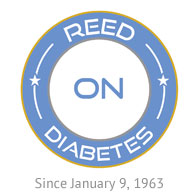Both my Mom and Dad were there for me as I grew up living with diabetes. This was the 1960s and 70s, and my Mom mostly stayed home with my sister and me while my Father worked. My Dad’s work didn’t require much travel, so he was there for us every day. He encouraged me to live a full life and did what many Dads like to do – played endless hours of catch in our backyard, coached my baseball teams, and helped with homework.
He also recognized that diabetes was a part of my life and was there for me as I lived it with the Big D. I remember driving from work to my elementary school after I went low and passed out playing kickball during recess. He was the first person I saw as I woke up in the school nurse’s office. Seeing his face was reassuring as I tried to figure out what had happened. One night while I was asleep, my Mom and Dad sensed my blood sugar was low. It was so low that they couldn’t wake me up. So in the middle of the night, my Dad called a neighboring physician, who came to our home and administered glucagon to pull me out of a bad hypoglycemic episode.
In addition to being a part of my life with diabetes, my Dad was a provider. His work was the source of our family’s funds … our home, food, clothes, school supplies, and money to do fun things like play sports. And with diabetes, there is the additional cost of prescriptions and medical supplies. I took it for granted then, but I don’t know. I was on a life support protein called insulin, discovered only 40 years before my diagnosis. That insulin, the syringes, urine testing supplies, and regular doctor visits were direct costs that my Dad provided for me. Diabetes is expensive to manage, and I never heard him complain about it. He always made sure I had what was needed.
Those were the obvious ways my Dad supported me growing up with diabetes. But as I reflect on our relationship, I realize he gave me so much more. Sons learn by observing their fathers. My Dad was born in the heart of Appalachia during the Great Depression. He grew up in a house with his Mom and Dad, four siblings, and no running water. He walked several miles to school while handling chores on the family tobacco farm. His older brother advised him to develop basketball skills to make the high school team. He didn’t understand why until he heard the answer, “Hot showers after practice.” My Dad joined the Air Force during the Korean War and went through college on the GI bill. That’s how he met my Mom, and he received a Civil Engineering degree and a job after graduation.
I’m appreciative for the lifestyle my Dad provided, but also for the way he taught me to approach life. My life included type 1 diabetes and the qualities I observed in him taught me how to approach it with perseverance, motivation, discipline, and the courage to change.
Thanks, Dad!

